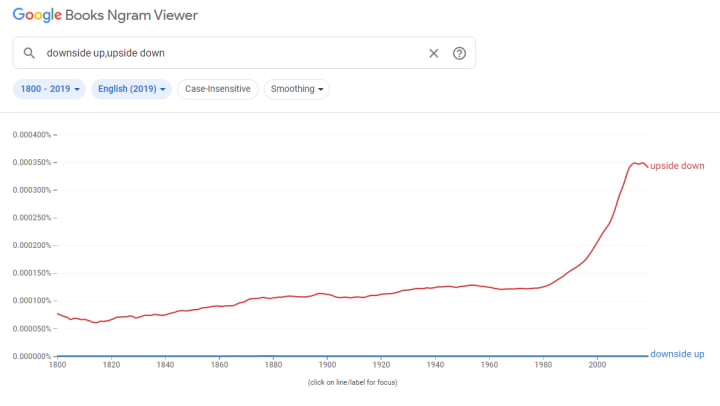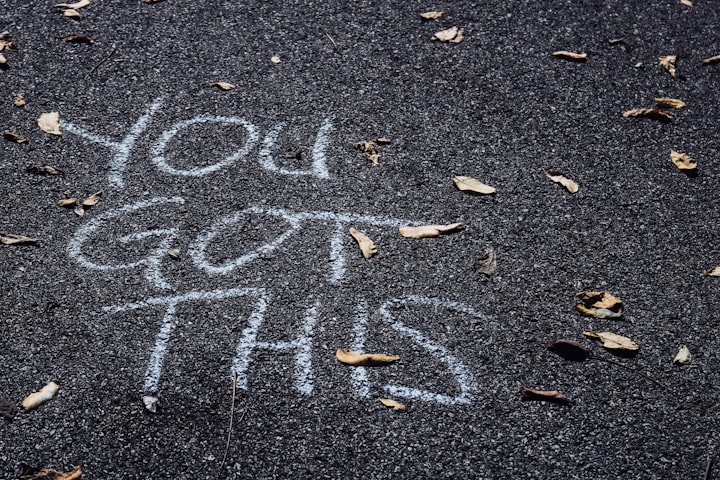The Low Down on Upside Down
Which word in upside down didn't belong?

upside down adverb
1: in such a way that the upper and the lower parts are reversed in position
2: in or into great disorder
-Merriam-Webster
I don't know if you were like me as a child, but I loved the blood rushing to my head when I lay upside down. If I moved too fast, I gave myself a headache or an upset stomach. But if I did it just right, my stomach dropped as if I was swinging or on an amusement ride.
I had never thought of the history of the phrase "upside-down" until a morning several years ago. I awoke and stared at an upside-down children's book on my floor. That's when I wanted to know: Where did we get the phrase upside down?
Etymology of Upside Down
It is literally the up side being down. I googled the etymology of the word and I was wrong about the word side belonging to the phrase. Here's the real way the word came about:
Upside down comes from the Middle English phrase up so down (c. 1300), which was then combined into upsadoun a century later (c. late 1400s). We see this today in compound words such as warmup or cool down. It's conjectured that so meant "as if"; thus "up as if down". Nothing to do with the word side.
Upside down first appeared with side in the late 1500s, so it appears that it took one hundred years for the transition to happen. At that same time, printing press companies created standard spellings. Without widespread literacy, humans rely on sound to make meaning. Thus without a standard, English speakers probably confused the 'sad' of upsadoun to mean side. (We have the word upside which is up + side that came into English several hundred years later--written in 1610.)
Downside Up
No, ' faith,' tis better now,' tis downside up: Our part o'the wheel is rising, though but slowly.
--John Dryden, Sir Walter Scott, in The Works of John Dryden, p. 92, 1808
"I think it is--yes, sir,--thank you sir,--sorry to be so troublesome," said the man as never missed his man, (for it was he) "very sorry--very," evoluting the paper two or three times, and turning it upside down as many, and downside up within a one-seventh;"
--Thomas Hall in The Life, Adventures, and Opinions of a Liverpool Policeman, p. 78, 1845
Researching "upside-down", I discovered the obvious, but obscure, synonym "downside up". "Downside up" makes sense yet it isn't as common as "upside-down". To view the obscurity of the phrase "downside up", I ran the two phrases through Google Ngram (pictured below). In fact, it appears "downside up" may not have come into written usage until 1805. So the phrase must have existed orally prior to this. So far, I can't find any evidence besides the Google Books Ngram to account for the phrase's etymology. I have included two examples above of how it was used. In several books on Google, the phrase is used alongside "upside-down".

Other Synonyms
Besides "downside up", "Upside-down" has synonyms that I personally find more intriguing, such as topsy-turvy and bottom-up. Other synonyms play on the sense of "upside-down" as disorder--haywire and helter-skelter. (Again, I like the stranger synonyms.) The most accurate and concise synonym is inverted, but I rarely hear that phrase outside of more formal settings. For a more exhaustive list of "upside-down", visit thesaurus.com.
Do you use inverted?
Upsidedown, Upside Down, Upside-down
How do you spell upside-down? Researching this I have run into "upsidedown", "upside down", and "upside-down". This runs into the common problem of compound words being separate, hyphenated, or one word. Generally, the pattern goes from separate words, hyphenated, and then one word. Grammarly wants me to spell it with a hyphen. Microsoft Word's editor only flags it as one word. So the phrase is obviously in flux. Who knows when it will have a consistent way to spell it.
For more of my musings, visit my blog, Facebook page, or Twitter. And I always appreciate it if you subscribe, follow me on social media, tip, comment, or pledge. Thanks!
About the Creator
Enjoyed the story? Support the Creator.
Subscribe for free to receive all their stories in your feed. You could also pledge your support or give them a one-off tip, letting them know you appreciate their work.






Comments
There are no comments for this story
Be the first to respond and start the conversation.